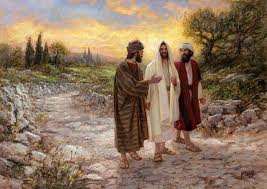
- 02- March 2025 -
Eight Sunday in Ordinary time - Year C
Gospel text Luke 6:39-45
vs.39 Jesus told a parable to his disciples:
“Can one blind man guide another? Surely both will fall into a pit?
vs.40 The disciple is not superior to his teacher; the fully trained disciple will always be like his teacher.
vs.41 Why do you observe the splinter in your brother’s eye and never notice the plank in your own?
vs.42 How can you say to your brother, ‘Brother, let me take out the splinter that is in your eye,’ when you cannot see the plank in your own? Hypocrite! Take the plank out of your own eye first, and then you will see clearly enough to take out the splinter that is in your brother’s eye.
 vs.43 There is no sound tree that produces rotten fruit, nor again a rotten tree that produces sound fruit.
vs.43 There is no sound tree that produces rotten fruit, nor again a rotten tree that produces sound fruit.
vs.44 For every tree can be told by its own fruit: people do not pick figs from thorns, nor gather grapes from brambles.
vs.45 A good man draws what is good from the store of goodness in his heart; a bad man draws what is bad from the store of badness. For a man’s words flow out of what fills his heart.”
**************************************************
We have two commentators available to us today
Michel DeVerteuil : Holy Ghost Priest, director of the Centre of Biblical renewal .
Donal Neary SJ: Editor of The Sacred Heart Messenger and National Director of The Apostleship of Prayer.
****************************************
Textual Comments
This passage can be read in the context of last week’s reading, as four parables, four concrete applications of the two central principles stated in last week’s passage - loving our enemies and sharing our possessions with the poor:
- verse 39: enlightened leadership
- verse 40: trained disciples
- verses 41-42: hypocrisy in correcting others
- verses 43 – 45: action must flow from faith, from inner conviction.
Using words for good rather than for evil is a very concrete application which we might want to reflect on. There are many ways in which we can make a destructive use of words, forgetting that they have tremendous power.
Reflection on the Text
 Good news: the fully trained disciple will be like his teacher. We, Jesus’ disciples, are called to be like him. Our doubts about ourselves, our feelings of inadequacy arise, in part, from the fact that we forget that we did not choose him – he chose us; no one can come to the Father unless he draws him. We have been chosen, God has chosen to trust us, he believes that we can be true disciples. This should be for us a source of great joy and great humility, and determination to become “fully trained,” and self-confident. If I am his disciple it is because he has chosen me and trusts me to become like him. This is something to be celebrated gratefully.
Good news: the fully trained disciple will be like his teacher. We, Jesus’ disciples, are called to be like him. Our doubts about ourselves, our feelings of inadequacy arise, in part, from the fact that we forget that we did not choose him – he chose us; no one can come to the Father unless he draws him. We have been chosen, God has chosen to trust us, he believes that we can be true disciples. This should be for us a source of great joy and great humility, and determination to become “fully trained,” and self-confident. If I am his disciple it is because he has chosen me and trusts me to become like him. This is something to be celebrated gratefully.
This will lead us to a new and deeper commitment: we must learn to listen to him and must be willing to learn from him, otherwise we will only be like the blind man leading other blind people and falling certainly into a pit. If we take discipleship seriously, we must commit ourselves to listening and learning and being trained.
 The fruit of prayer will be to reveal the plank in my own eye; until I have meditated deeply on a gospel passage and experienced conversion, I have nothing to say to anyone else. I would be a hypocrite were I to attempt doing so.
The fruit of prayer will be to reveal the plank in my own eye; until I have meditated deeply on a gospel passage and experienced conversion, I have nothing to say to anyone else. I would be a hypocrite were I to attempt doing so.
The test of the good disciple is in the fruit. People who came into contact with Jesus experienced healing, forgiveness, inner peace. Goodness wells out of the heart of the good disciple, who brings good news. The imagery is very dramatic - the thorns and brambles and rotten fruit. Notice too that what matters is what “fills the heart”, not scholarly knowledge and cleverness. Good fruit – action – will grow out of commitment at the heart level, not 'wilful' intellectual determination with clenched teeth.
“Spiritual poverty clings to what is his own and nothing clings to it.” ...Meister Eckhart
Lord, we know that there are many blind people in our world who are at present leading others who are themselves very blind.
We know that they must both end up in the one place only.
They will fall into a terrible pit, where they will hurt themselves and also those others who let themselves be guided by them to a safe place.
“I am disarmed of the will to overcome, to justify myself as the expense of others. I am no longer on the alert, jealously guarding my riches.” ....Patriarch Athenogaras
Lord, we as your disciples cannot be superior to our great and noble teacher with his own greatness and goodness.
Remind us that we are all fully trained disciples and so we will only have the power to help others, as you did, get to the brightness and greatness of God’s presence and to live there for ever.
Lord, forgive us that we look for the splinter in our brother’s or sister’s eye and so do not notice that there is a plank in our own.
Remind us Lord, that we cannot say to our brother or sister,
“Let me take the splinter that is in your eye,” and never even notice that there is a plank in ours.
Remind us, Lord, how hypocritical we are, help us to take the plank from our own eye first and then we will see clearly enough to take out the splinter that is in our brother’s or sister’s eye.
“Whether it is the surface of Scripture or the material form of nature, both serve to clothe the Christ. They are two veils that mask the radiance of the faith and at the same time reflect his beauty.” ....John Scotus Eriugena
Lord, remind us that no sound tree ever produces rotten fruit, and a rotten tree can only produce rotten fruit. Remind us that every tree can be told by its own fruit, that people do not pick figs from thorns nor gather grapes from brambles.
“Many of those who reject the Word of God, reject it because the way we say it is utterly meaningless to them. They know the dimension of the eternal but they cannot accept our names for it. If we want them as free persons, we must know they have received a word from the Lord.” ....Paul Tillich
Lord, remind us that people draw
what is good from what is a store of goodness in their hearts.
A bad person draws what is bad from their store of badness.
A person’s words will naturally flow out from what fills their heart.
*****************************
Donal Neary S.J.
Gospel reflections For Sundays of Year C
www.messenger.ie/bookshop
She must have a lovely heart !
Someone said to me of a friend - She must have a lovely heart! The Gospel today is about goodness inside and that we draw much from the store of goodness inside ourselves.
A way of looking at this is to wonder what makes us feel positive in ourselves about others and about the world. We have days when we feel truly grateful for much in life and in the world, and the store of goodness fills up. There are days when the opposite happens, and Jesus speaks of the 'store of badness'.
The store of goodness is filled up in many
~ a good conversation with a loved one,
~ time spent with an infant in wonder of how and what this child is and will be,
~ listening to some good music and admiring good art,
~ taking time to pray and listening to the word of Jesus in the Gospel,
~ finding time to pray with others at the Mass or in prayer groups.
God in many ways increases our store of goodness and we allow this happen.
You can find your favourite ways of bringing out the best in yourself.
We know of people we meet whom we always feel the better for meeting.
Prayer and faith should always bring the best out of us:
give time each day to to allow the total love of God for us to reach us.
Another store of goodness is the goodness of self.
We can be too critical of ourselves and if so, we will probably find we are critical of others. Look this day into the mirror and give thanks to God for the man or woman you see there. If you look on ourselves with love, we will look on others the same.
Lord, teach me your goodness.
____________________